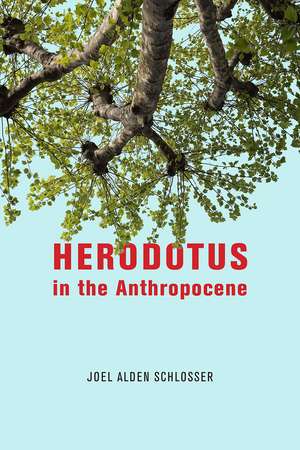Herodotus in the Anthropocene
Autor Joel Alden Schlosseren Limba Engleză Paperback – 15 iul 2020
Schlosser shows that the Histories, which chronicle the interactions among the Greek city-states and their neighbors that culminated in the Persian Wars, illuminate a telling paradox: at those times when humans appear capable of exerting more influence than ever before, they must also assert collective agency to avoid their own downfall. Here, success depends on nomoi, or the culture, customs, and laws that organize human communities and make them adaptable through cooperation. Nomoi arise through sustained contact between humans and their surroundings and function best when practiced willingly and with the support of strong commitments to the equality of all participants. Thus, nomoi are the very substance of political agency and, ultimately, the key to freedom and ecological survival because they guide communities to work together to respond to challenges. An ingenious contribution to political theory, political philosophy, and ecology, Herodotus in the Anthropocene reminds us that the best perspective on the present can often be gained through the lens of the past.
| Toate formatele și edițiile | Preț | Express |
|---|---|---|
| Paperback (1) | 236.45 lei 6-8 săpt. | |
| University of Chicago Press – 15 iul 2020 | 236.45 lei 6-8 săpt. | |
| Hardback (1) | 569.09 lei 6-8 săpt. | |
| University of Chicago Press – 8 dec 2020 | 569.09 lei 6-8 săpt. |
Preț: 236.45 lei
Nou
Puncte Express: 355
Preț estimativ în valută:
45.25€ • 46.75$ • 37.66£
45.25€ • 46.75$ • 37.66£
Carte tipărită la comandă
Livrare economică 25 martie-08 aprilie
Preluare comenzi: 021 569.72.76
Specificații
ISBN-13: 9780226704845
ISBN-10: 022670484X
Pagini: 216
Dimensiuni: 152 x 229 x 18 mm
Greutate: 0.29 kg
Ediția:First Edition
Editura: University of Chicago Press
Colecția University of Chicago Press
ISBN-10: 022670484X
Pagini: 216
Dimensiuni: 152 x 229 x 18 mm
Greutate: 0.29 kg
Ediția:First Edition
Editura: University of Chicago Press
Colecția University of Chicago Press
Notă biografică
Joel Alden Schlosser is associate professor and chair of political science at Bryn Mawr College. He is the author of What Would Socrates Do?: Self-Examination, Civic Engagement, and the Politics of Philosophy.
Cuprins
Introduction
1 The Nature of Things
2 The Known World
3 The Practice of Nomos
4 Narrating Inquiry
5 Freedom and Earthly Flourishing
Conclusion
1 The Nature of Things
2 The Known World
3 The Practice of Nomos
4 Narrating Inquiry
5 Freedom and Earthly Flourishing
Conclusion
Acknowledgments
Notes
Bibliography
Index
Notes
Bibliography
Index
Recenzii
“Schlosser is a master at making old texts relevant to the new world, and, with Herodotus in the Anthropocene, he brings Herodotus into conversation with the present, as a kind of corrective to modern liberal political theory. Such an orientation toward the political world—toward human activity and possibility—is one we need to embrace in the present, anthropocenic age. This is a strong and provocative explication that deserves attention in political theory and beyond.”
“Herodotus can serve as an engaging guide to a contemporary understanding of the challenges emerging from a changing and powerful nature that is itself constituted by human actions. There is much that is valuable and insightful that comes from reading Herodotus; Schlosser most skillfully and elegantly connects those insights to the larger themes of nature and human interaction and the consequences of those interactions for our political life.”
"There is something in this engagingly written book for several interest groups. For the student of Herodotus there is the stimulus of being asked to admire, as virtues, characteristics of his approach to history which are more frequently regarded as vices; for the student of political science there are some interesting insights into to the complicated characteristics of democracy; for the student of the Anthropocene there is the encouragement to use the example of Herodotus to think more pluralistically about their research."
"Schlosser’s rich and detailed account of the Histories will be of great interest to scholars of Herodotus, stretching far beyond Herodotus’s relevance to the Anthropocene. There are textually detailed and careful readings of the many episodes of the Histories, rethinking and reinterpreting foundational ideas such as nomoi, the oikeomenê (the known world), equality. . . and freedom (elutheria)."
